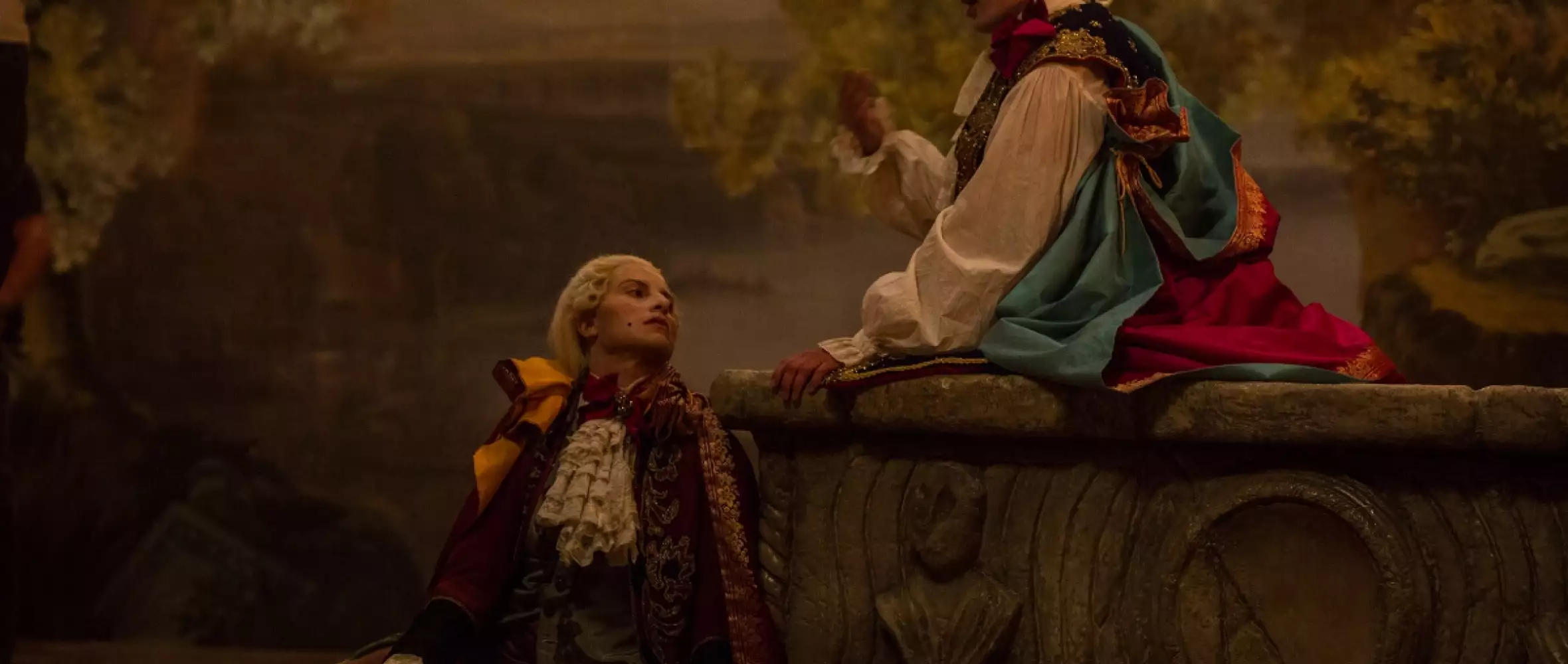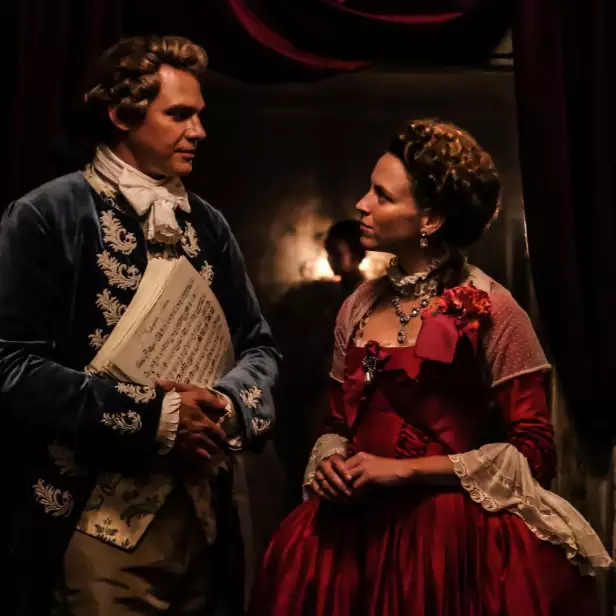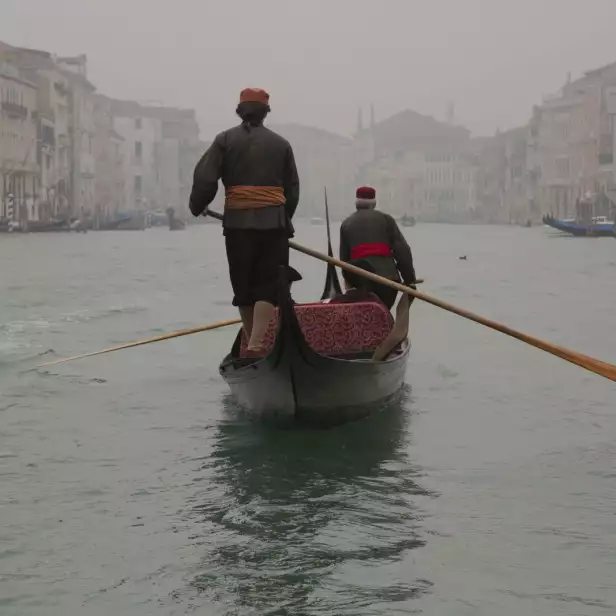
16 March 2021
Petr Vaclav Soon to complete his dream film Il Boemo
Petr Vaclav Soon to complete his dream film Il Boemo

Acclaimed Czech director Petr Vaclav spent more than 10 years preparing and working on his opus magnum, the epic Il Boemo. Shooting on the Czech-Italian-Slovak coproduction wrapped in the second half of 2020, despite coronavirus complications, and Vaclav is now editing and completing the film. Il Boemo tells the story of one of the most exalted composers of the late 18th century, Josef Mysliveček, and features leading stars of the opera world.
Article by Pavel Sladký for CZECH FILM magazine / Spring 2021
Il Boemo tells of the extraordinary fortunes and lifework of one of classical music’s most important figures, Josef Mysliveček (1737–81), friend and teacher to Mozart. Mysliveček was a major star in 18th-century Italy before his fall from grace and death in obscurity. The director’s interest in making the film extends beyond Mysliveček’s music to his inner motivations and passions, his need for artistic fulfilment and his dramatic life.
In referring to his main character, Petr Vaclav invariably uses his first name. “Josef abandoned all of the certainties that went along with being a Prague bourgeois and set off for Italy, into the unknown. That interested me, as did his struggle with the disease he contracted towards the end of his life,” says the director. “Josef never withdraws into his misfortunes, and he doesn’t become bitter. To the contrary, he takes an interest in the lives and conditions of the opera’s characters. He channels their emotions and conflicts with a new kind of force,” Vaclav says of his protagonist. “In the last stage of his life, Josef knows nothing but poverty, solitude, and obscurity. But we can still envy his existence as one of great self-fulfillment. The music he left behind is truly fascinating!”
Mysliveček’s output included twenty-eight operas, eight oratorios, dozens of symphonies, and over a hundred chamber pieces. His work was played in all the courts of Europe, which music historians view as evidence of his ability to acclimate to new cultural environments.
The road to divinity
As a big-budget, director-driven film, Il Boemo is a rare project by Czech standards and has been a long time coming for Vaclav and his collaborators. The FAMU graduate, who now resides in France, debuted in 1996 with his film about a Roma boy, Marian, which won him the Silver Leopard at Locarno. Vaclav is also known for his films Parallel Worlds (2001) and The Way Out (2014), which premiered in San Sebastian and the ACID section in Cannes respectively. The Way Out, which focused on a young Roma woman trying to escape her poor living conditions, won seven Czech Lions in 2014, including Best Film, and also four Czech Film Critics’ Awards.
The drama We Are Never Alone (2016), about border-town families whose lives tragically intersect, received the Berlinale’s Tagesspiegel Readers’ Award, and screened at the Toronto IFF. In addition to social and psychological dramas, Vaclav also directed Confession of the Vanished, the 2015 documentary about a performance of Josef Mysliveček’s opera Olimpiade and the composer himself, which served as prep work for his feature-length narrative film.
The year of the coronavirus? A silver lining
“Il Boemo is by far the most demanding project I’ve ever worked on,” says producer Jan Macola (Mimesis Film), a regular collaborator of Vaclav’s. “It’s a film set in the 18th century, a period piece, made in coproduction with Italy and Slovakia. And I don’t think I even have to say that the events of 2020 didn’t make it any easier on us.”
Because of the pandemic, the filmmakers had to reorganize their plans for shooting several times. “We weren’t allowed to use some of the shooting locations we had planned on originally that were very important to me,” says Vaclav. “I lost some actors and crew when the suspension of work due to COVID caused a free-for-all after the first wave, with competition among all the films suddenly gearing up at the same time. We could never be entirely certain lead actors would actually show up to the set and the shoot would continue. Some scenes had to be left out or rewritten because one of the actors tested positive or ended up in quarantine. Luckily, that never happened to the lead roles. Despite it all, we were actually really lucky and ended up being able to use every single day of our main filming period.”
The important and very expensive musical scenes had been shot earlier, in summer 2019. By spring 2020, there was no option of suspending the project. “We were in very close contact with coproducers Marco Alessi and Marek Urban, and we looked for viable ways to get things done,” says Macola. “At the same time, there was a silver lining. Thanks to the pandemic, it was no problem to shoot in places that would otherwise have been full of tourists, and the actors had far less engagements than they usually would. That allowed us to work intensively, without a lot of unnecessary breaks in the shooting plan.”
The 18th century as if it were today
Vaclav conceived Il Boemo as if it were an intimate film from the present day. “I have to treat carriages, gondolas, and other traffic as if they were cars or buses: They’re not what I’m interested in, they’re not what I’m shooting, or if so, then only marginally. What I’m focused on is the characters,” says the director. He sees the film as a distinctive combination of the spectacular and the austere. “I think we were able to come up with excellent sets for the opera scenes. With the interiors, we went for as much simplicity and moderation as possible. We used both preserved and arranged sets, depending on what was available. The costumes were partly tailored and partly from Italian wardrobe departments. They’re really very beautiful.”
Given the need to shoot a historical film as if it were set in the present, Vaclav chose Spanish cinematographer Diego Romero. “I thought it would be best to have a D.O.P. who had shot a lot of documentaries and films of a documentary nature. And I really like Diego’s films, particularly the ones he did with Roberto Minervini (Stop the Pounding Heart, The Other Side, What You Gonna Do When the World’s on Fire, etc.)”
Shooting locations included the Doksany Convent and the Cistercian monastery in Plasy. Other scenes were filmed in the Martinic Palace and the Colloredo–Mansfeld Palace in Prague, the chateau at Jaroměřice nad Rokytnou, and of course in venues such as the Mahen Theater in Brno. The most difficult and spectacular part of the shoot in the Czech Republic, which included complicated stunt scenes, was filmed in the Estates Theater in Prague, where parts of Miloš Forman’s Amadeus were made.
International opera stars conducted by Václav Luks and Petr Vaclav
The film boasts leading Czech actors and international opera stars. “Nationality didn’t play much of a role. Especially for the singers, who live on the road, so their work is their home,” says Vaclav.
Il Boemo features such top operatic performers as Emöke Barath, Raffaella Milanesi, Philippe Jaroussky, Krystian Adam, and Juan Sancho. “For the soprano of actress Barbara Ronchi, who learned to lip-synch amazingly, we borrowed the voice of Simona Šaturová,” adds Vaclav.
Czech actor Vojtěch Dyk, well-known from popular series and films, is also a musician in the bands Nightwork and B-Side Band. That, too, was a factor in his getting the lead role of Josef Mysliveček. In supporting roles, audiences will recognize actors from other films by Vaclav, including Lenka Vlasáková, Karel Roden, and Zdeněk Godla. But Vojtěch Dyk’s “Divine Bohemian” in Il Boemo is also surrounded by such Italian leading lights as Elena Radonicich, Federica Rosellini, Lana Vladi, and musician Federico Vecchio.
“The Neapolitans are of course played only by Neapolitans, and I tried to cast as many actors speaking Venetian and Lombardian dialects as possible in Venice, to avoid opening the Pandora’s box of the Venetian language but stay true to the Venetian cadence,” Vaclav says, describing his pursuit of cinematic and linguistic authenticity.
“Regular virus testing for all of the actors and crewmembers did mean increased costs and, together with mask-wearing, a degree of discomfort, but everyone accepted that as the toll of being able to do the jobs they love and that keep them afloat,” adds producer Jan Macola about the operational aspects of working with actors amid worldwide COVID restrictions.
Something never seen or heard before
Music is, of course, a fundamental component of Il Boemo. The music for the film was performed by the internationally acclaimed orchestra Collegium 1704, led by Václav Luks. The orchestra and its conductor are resident artists of the Opéra Royal & Chapelle Royale de Versailles and will be very familiar to attendees of prestigious music festivals like the Salzburger Festspiele and concert halls in Versailles, Vienna, Berlin, and Hamburg.
“Václav Luks has been a critical support right from the outset, when I began collecting material for the screenplay. He has helped me penetrate the music of the 18th century and understand Mysliveček the composer,” says Vaclav, who is unsparing in his praise. “There are arias by Mysliveček that no one has heard since he performed them himself.”
The soundtrack will be released by Warner Classics on their prestigious Erato label. “We’ve endeavored from the very beginning to make Il Boemo essentially a universally understandable tale of an artist trying to make it amid the stiffest of competition. At the same time, I feel certain that the quality of the musical scenes is unique and that, regardless of whether one is a fan of classical music, it will be something they have never seen or heard before. Under the direction of conductor Václav Luks, we recorded live, with a full orchestra and world-renowned opera stars like Philippe Jaroussky and Emöke Baráth,” says the director.
Il Boemo has a budget of €4.6 million. The Czech-Italian-Slovak coproduction was supported by the Czech Film Fund with €912,000 and also by the Film Foundation, the Prague Film Fund, the Pilsen Region, the South Moravian Film Fund, the Italian Ministry of Culture, and the Slovak Audiovisual Fund. The producer is Jan Macola and Mimesis Film, the coproducers are Marco Alessio (Dugong Film) in Italy, Marek Urban (sentimentalfilm) in Slovakia, and Czech Television and MagicLab in the Czech Republic.
The premiere of Il Boemo is planned for autumn 2021.






